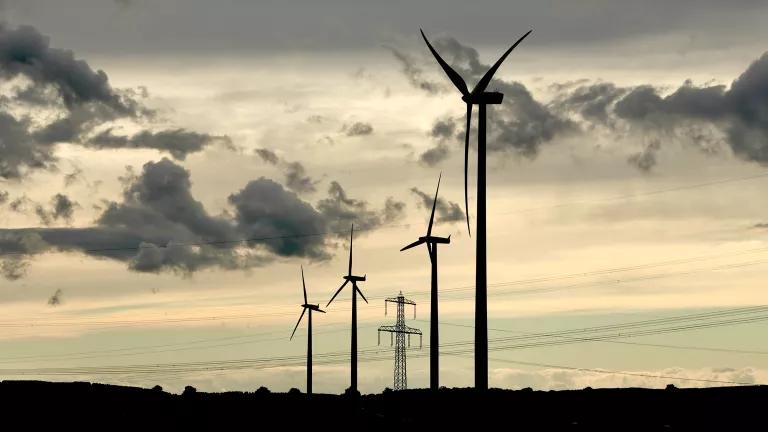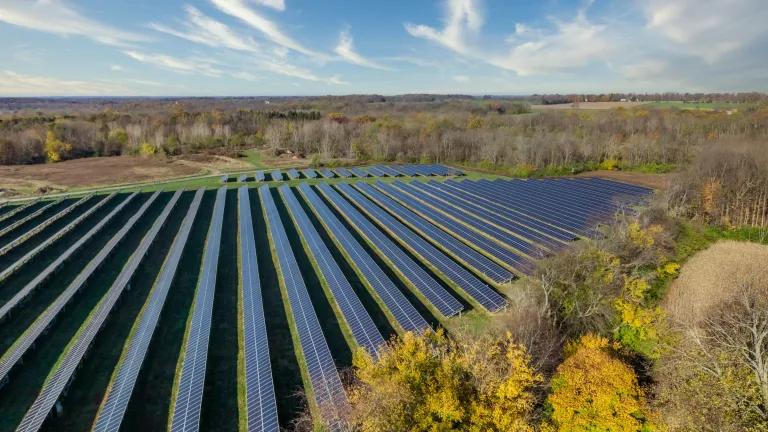As Illinois’ spring legislative session just drew to a close, the state is unfortunately deferring to a later date to resolve not only its epic budget crisis, but also decisions regarding the state’s energy future. However, at least with respect to energy policy, significant progress was made. It was particularly encouraging to see one of the country’s largest investor owned utilities supporting legislation that would fundamentally change its business model to one based on investments in a clean energy future.
First, a little background:
NRDC is a proud member of the Clean Jobs Coalition, a group formed over a year ago by hundreds of businesses and organizations representing environmental, consumer, health, and faith communities across the state. The Clean Jobs Coalition’s purpose is passing Clean Jobs Legislation which would significantly expand the state’s electric utilities’ investment in energy efficiency and renewable energy, thereby saving consumers money, creating thousands of new jobs and cutting carbon pollution. If enacted, these policies would help meet new federal guidelines under EPA’s Clean Power Plan. These goals have attracted a majority of bipartisan support from lawmakers and more recently, taken root with some of the country’s largest utilities.
NRDC and several of our partners in the Clean Jobs Coalition have been working for months with Commonwealth Edison (ComEd), the state’s largest electric utility, and Exelon, its parent company, to create a shared vision about the state’s energy future. The results of these discussions have been quite encouraging. For example, legislation filed in early May by State Senator Donne Trotter, with support by ComEd and Exelon, would make Northern Illinois a national leader in advancing energy efficiency. Under this Next Generation Energy Plan (Senate Bill 1585, Senate Amendment 3) bill introduced in early May, ComEd is committing to reduce its electric sales by 18.5% by 2025 and 23% by 2030. That level of energy savings is forecast to lower electric bills for ComEd’s customers by at least an additional $4 billion – and probably $10 billion or more – over the next 15 years.
In large part, the agreement on ComEd’s energy efficiency savings targets was reached because we were successful in aligning ComEd’s business incentives with the interests of its customers in saving energy when it is cheaper than building and operating new power plants and the poles and wires necessary to bring power to consumers. Under the new legislation, ComEd would, for the first time, earn a rate of return on efficiency investments comparable to what it earns for investing in new electricity supply infrastructure. Moreover, if the utility fails to reach its savings targets, its return on investment goes down; if it exceeds the new aggressive savings targets, its return can go up, which can be thought of as using a “carrot and stick.” NRDC, which played a lead role in helping to negotiate agreement on the new energy savings targets and incentives for meeting them, commends ComEd’s willingness to commit to this new paradigm for helping its customer minimize their energy costs while also reducing pollution and creating jobs.
Unfortunately, Ameren Illinois has not yet committed to providing the same benefits to its customers. This is a problem we hope to remedy going forward. The same structure and set of incentives for enabling ComEd’s shareholders to benefit from helping its customers invest in efficiency could apply to Ameren, creating a “win-win” for both the utility and its customers. Ameren’s support for Senate Amendment 4 to SB 1585 on Friday, which would significantly weaken efficiency targets, was problematic and NRDC plans to work with Ameren in the coming weeks to discuss their concerns about how to meet new aggressive, but cost-effective savings targets.
There are many other important components to the omnibus Next Generation Energy Plan. NRDC is not currently endorsing all of them; nor are we prepared yet to endorse the sum of what has been proposed. However, we are encouraged by the progress made recently in negotiations over reforms to the state’s Renewable Portfolio Standard (RPS) in ways that would help drive new development of wind and solar projects. Fixing the RPS is of paramount importance to NRDC and appears to be within reach.
Several other key issues that will also require a similar amount of attention and discourse, including both Exelon’s proposal to provide financial support to two of its distressed nuclear assets that may be at risk of closure, and a new rate structure for residential customers that could have adverse effects on the economics of solar and energy efficiency investments. Each of these components of an omnibus energy bill will require thorough review and evaluation so we can fully understand potential impacts for consumers, the economy and environment. And the way that all such provisions fit together will be critically important to our goal of ensuring that the state’s energy future is bright and truly focused on clean energy. NRDC is committed to a process that leads to a successful resolution and believes that many of the issues under discussion have the potential—if carefully crafted—to fit together in a way that would drive the state towards an innovative energy future that truly benefits consumers, the economy and the environment.
While lawmakers struggle to find common ground on many of the challenges facing our state, it is NRDC’s hope that we continue to work through the issues and agree on a clean energy path forward for Illinois.



